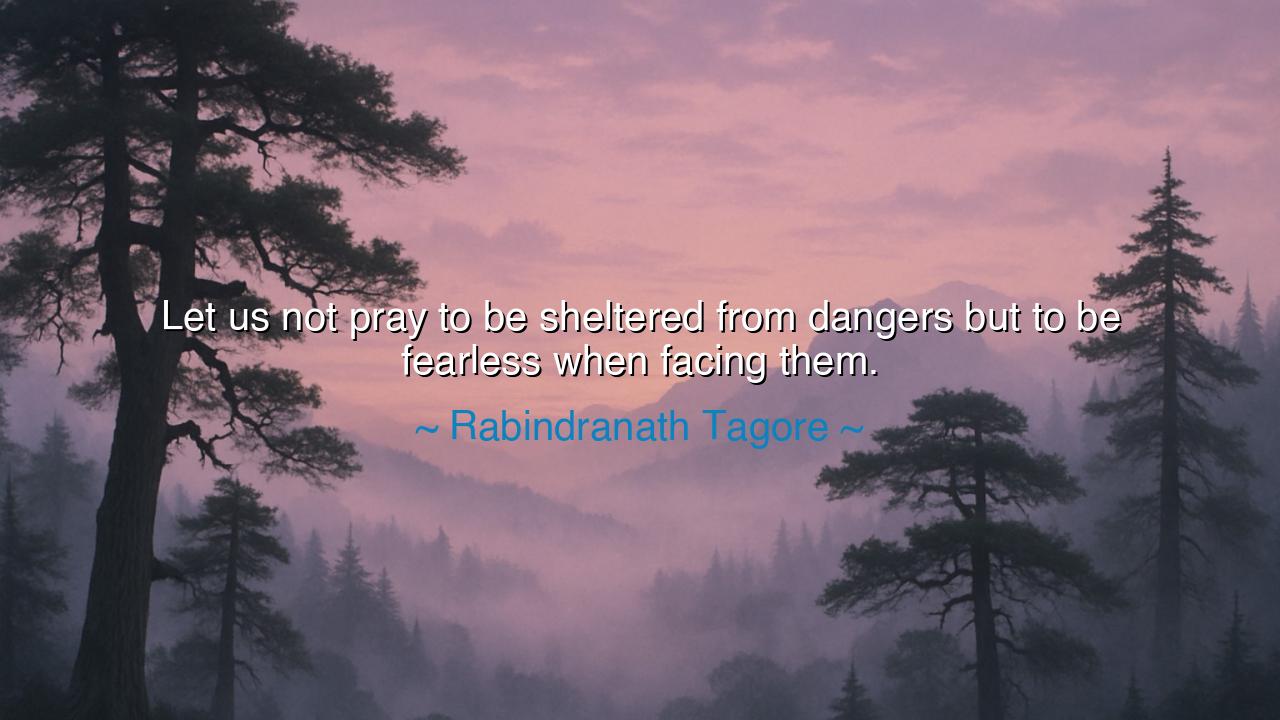
Let us not pray to be sheltered from dangers but to be fearless






“Let us not pray to be sheltered from dangers but to be fearless when facing them.” Thus spoke Rabindranath Tagore, the sage of Bengal, whose words shine like a flame against the dark uncertainties of life. In this profound prayer, he reveals a truth that transcends time and faith — that strength of spirit is far greater than the comfort of safety, and that true peace is not found in the absence of trial, but in the courage to endure it. His words are not merely poetic; they are a summons to awakening, a reminder that the divine does not promise us shelter from the storm, but the heart to walk through it unafraid.
Tagore, the poet, philosopher, and first non-European Nobel laureate in literature, lived in an age of upheaval. His homeland, India, was bound under colonial rule, and his people struggled for both national freedom and spiritual dignity. Yet Tagore did not call for hatred or retreat. He called for fearlessness — not as recklessness, but as a higher strength of soul. To be fearless, he taught, is to trust in one’s inner light, to move through the darkness knowing that the divine dwells not in safety, but in courage. Thus, his prayer — that we do not ask the heavens to protect us from danger, but to grant us bravery when danger comes — is both a spiritual and moral commandment.
In the wisdom of the ancients, courage was the first of all virtues, for without it, no other could be practiced. The Greeks called it andreia, the Romans virtus, and in India, it was abhaya — the absence of fear. To pray for fearlessness is to ask not for an easier life, but for a stronger soul. It is to say: “Let my trials be many, if only my heart remains unbroken.” This is the courage of the saints, the heroes, and the lovers of truth — those who accept the call to face suffering not as victims, but as warriors of light. For every danger faced with calm and faith becomes not a curse, but a teacher.
Consider the life of Mahatma Gandhi, who was deeply inspired by Tagore and called him “Gurudev,” or revered teacher. Gandhi faced prison, humiliation, and the constant threat of death, yet never prayed for safety. Instead, he prayed for the strength to remain steadfast in truth and nonviolence. When beaten, he offered forgiveness; when imprisoned, he wrote words of wisdom. He embodied Tagore’s teaching perfectly — finding freedom not in protection, but in fearlessness. Such courage does not belong only to the great — it lives within all who stand firm for justice, endure hardship with grace, or love deeply in a world of uncertainty.
Tagore’s words also speak to the inner life. The dangers we face are not only those of war or oppression, but also of the heart — fear of failure, loss, rejection, and change. Many souls pray to be spared these trials, but Tagore bids us pray instead to face them with courage. For fear is the shadow that limits our growth, while courage is the dawn that dispels it. The soul that hides from pain also hides from joy; the one who avoids loss also avoids love. To be fearless is to live fully — to embrace all that life offers, both bitter and sweet, knowing that every experience shapes the spirit’s awakening.
There is a deep humility in this kind of courage. It is not the arrogance of those who believe themselves invincible, but the serenity of those who know that they will fall — and rise again. To be fearless is not to deny fear, but to walk with it as a companion, to act rightly even while trembling. The wise of every age have known this: that courage is not the absence of fear, but the decision to move forward despite it. Thus, Tagore’s prayer becomes an anthem for every soul seeking truth: “Do not take away my struggles, O Lord — give me the heart to meet them with grace.”
The lesson, then, is eternal: Do not ask life to spare you from its challenges. Ask instead for the strength to face them with honor. Let your prayer be not for safety, but for steadiness; not for ease, but for endurance. In every hardship, remember that fearlessness is the doorway to freedom, and courage the path to peace. When you feel danger rising like a tide, stand tall and say: “I am not here to escape life’s storms — I am here to learn how to sail through them.”
So remember the words of Rabindranath Tagore, and let them live within you: “Let us not pray to be sheltered from dangers but to be fearless when facing them.” In these words lies the secret of both strength and serenity. For the world will never cease to test you, but the one who meets danger with an open heart, trusting in truth and love, becomes untouchable — not because life has grown gentler, but because the soul has grown greater. And that, dear listener, is the highest peace life can ever grant.






AAdministratorAdministrator
Welcome, honored guests. Please leave a comment, we will respond soon